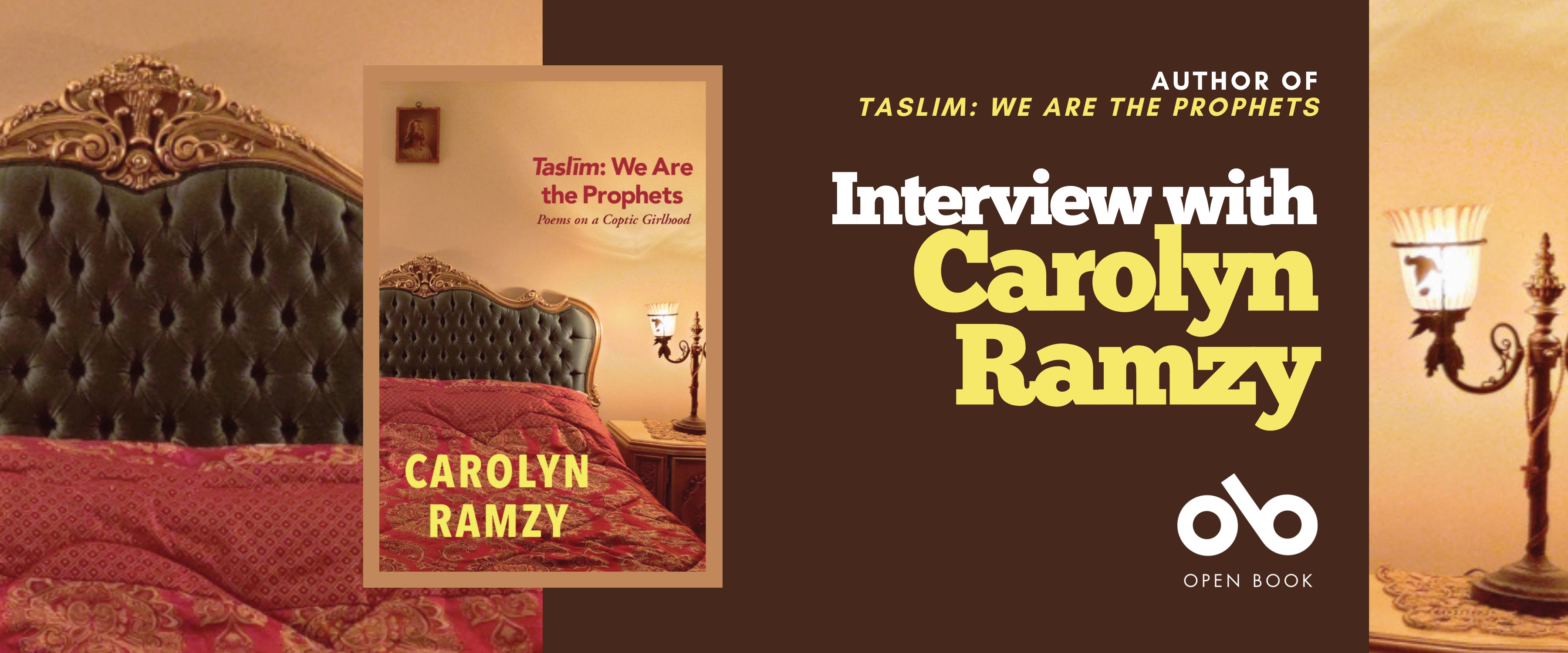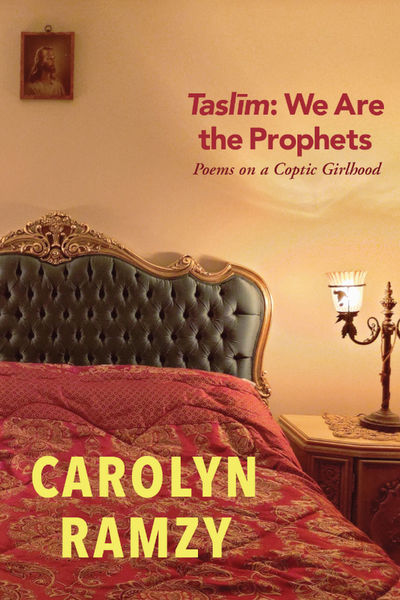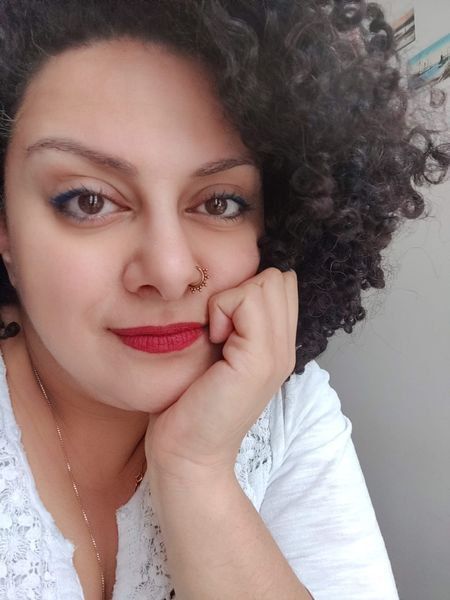Carolyn Ramzy Shares Profound Poetry About a Coptic Girlhood in Taslim: We Are the Prophets
Carolyn Ramzy's scholarly endeavours have taken her to a professorship in Ethnomusicology at Carleton University, where her main focus is on Egyptian Coptic Christian music-making. So it's no surprise that this area of expertise has influenced her poetry, especially when it comes to representing the voices of women who sing in these traditions while defying patriarchal controls and restraints.
In Taslim: We Are the Prophets (Mawenzi House), Ramzy explores these ancestral teachings with bold, defiant lines and an emphasis on all of the joys and sacrifices that women experience while following Coptic Orthodoxy. The collection comes together as a "feminist manifesto for freedom," raising the volume of these voices even in communities where those who carry the burden and responsibility of Taslim push against the most rigid binds. The author lyrically celebrates those who live with this complexity of faith and ancestral knowledge, and who choose to be free and loud as they carry tradition forward.
Find our more about this beautiful collection of poems in this Line & Lyric interview with the author!
Open Book:
Tell us about this collection and how it came to be.
Carolyn Ramzy:
I started writing poetry when I was sitting in my childhood’s church pews in Rochester, NY. As a transplanted Egyptian Coptic Orthodox girl, first to Canada, then the US, then back to Canada again, writing through these 3 to 4 hours long services helped anchor me as I was learning a new language and new ideas in university that often contrasted with the lessons I was learning in my own community. Importantly, writing these poems become a form of alternate prayer, helping me to process my changing world, one that often felt like I was living in between a rock and a hard place—that of my strict and immigrant Orthodox upbringing and the anti-Arab hostilities of a post 9/11 United States.
When I got older, I started sending these poems to my friends, often on Whatsapp, as a form of virtual camaraderie to get us through the sour and the sweet times of our lives. Over and over again, many of my nearest and dearest encourages me to publish them. So, I did. Effectively, this book is for this virtual village and the ones out there that I know are like it. I wanted to document how life and our collective camaraderie can be so very rich, especially as we cultivated it between a rock and hard place— as we became unchurched and community-less, as we raised our children map-less and different from our own upbringing and everything that we knew, and as we learned to forge a new spiritual home away from home.
OB:
Can you tell us a bit about how you chose your title? If it’s a title of one of the poems, how does that piece fit into the collection? If it’s not a poem title, how does it encapsulate the collection as a whole?
CR:
I come from a tight Upper Egyptian family who— through the generations— proudly held on to their traditions and faith, despite systemic religious discrimination, classism, and for Coptic girls especially, a patriarchal system that impacted everyone. Often the word taslīm, or the inheritance of ancestral knowledge from one generation to the next, framed our time together when we baked, when we prayed, and when we sang. Taslīm both acknowledges the importance of this collective oral transmission, but also hinted at the intergenerational losses our minority community has experienced in Egypt and beyond. When we and other Coptic Orthodox Christians immigrated, taslīm became especially important as it indexed fears of a new kind of loss: assimilation in a new homeland. And often, it is young Coptic Orthodox girls that are burdened by safekeeping the Orthodox faith, Orthodox children, and themselves—as often, Orthodox women are often framed as the last vestiges of homeland upbringing, knowing, and belonging.
This book sits with the burdens and the joys of taslīm for Coptic women. Many of the poetry in this book evoke the twined bind of keeping tradition alive while also changing as you navigate a Coptic Orthodox girlhood in diaspora. Taslīm as a collection, I hope, is a series of poems that I hold up as a mirror— of who we were taught to be, but also, who we hope to be as we are up against different challenges than our grandmothers and mothers who did the immigrating while pulsing with new ideas, a new language, and new ways of navigating the world in diaspora.
Your CanLit News
Subscribe to Open Book’s newsletter to get local book events, literary content, writing tips, and more in your inbox
OB:
Was there any research involved in your writing process for these poems?
CR:
I am an ethnomusicologist by training; I study music as culture using participant observation. In my last year at a prestigious Western classical conservatory, I decided to research the songs that my grandmother sang when we baked cookies for Christmas and Easter eid together. Called taratīl and taranīm, they are often a women-led genre and are the only songs we can openly lead in our community where men lead and sing the holiest hymns. I have not stopped researching these songs since. These songs helped me to learn so much about my grandmother’s experiences, and in turn, moored me as an immigrant Coptic girl as I was learning about my place in a new world.
As a researcher, I now lean on the use of poetry to keep learning about my Coptic world (and beyond). In this book, I quote the works of Sandra Faulkner, a feminist who reminds us that poetry is political practice, allowing us to bypass stifling social structures to represent ourselves. It is the best way to share quiet and unspoken cultural understandings out loud. Poetry, Faulkner insists, is a feminist practice, treading a blurred line as social research, autoethnography, and even a kind of visionary activism making way for a kind of new world-making (2017). I take her invitation seriously: through poetry, how can I imagine a new way of being an Orthodox Coptic woman perched not on our intergenerational inheritance of trauma and silence, but rather, an inheritance of song, agency, and many forms of transgressive joy built into our heritage.
OB:
Who did you dedicate the collection to and why?
CR:
In the spirit of taslīm, I dedicated this collection to the long lineage of women before me, my mother and grandmothers who ushered me through critical passages of girlhood. As a mother myself now, I also dedicated this book to my own family and to my sons, where it is my turn to gently pass on so many of the lessons I learned from the women before me. One of these lessons is the the upper Egyptian concept of 'izwa, or village; in a culture where family and connectively is thought to be the highest and most coveted form of social wealth, I nod to the many villages who have held me while putting together this work. Finally, I hold on to the hope that it is through the difficult conversation that this collection may inspire that we can keep on building these villages, especially for unchurched Orthodox Copts who may have found themselves in a kind of social exile as they exited their churches, families, and or more traditional community spaces.
OB:
Is there’s an individual, specific speaker in any of these poems (whether yourself or a character)? Tell us a little about the perspective from which the poems are spoken.
CR:
These poems are written from a first-person perspective in the form of an autoethnography—a method borrowed from the social sciences that index the author's personal experiences (auto) as they relate to a larger social and community group (ethnic) of historical experiences of migration, colonialism, religious discrimination, and racism among many other things (graphy). As an ethnomusicologist, I think of the reparative potentials of music and music-making and extend that to the ideas of writing and scholarship that also borrow and lean on the arts, and here, specifically lean on poetry to evoke and discuss bitter and sweet experience of growing up as a diaspora Coptic Orthodox immigrant and woman.
OB:
Was there a question or questions that you were exploring, consciously from the beginning or unconsciously and which becoming clear to you later, in this collection?
CR:
In this work, I want to explore the notions of a Coptic joy that had to be deferred to the afterlife and a strict purity culture that often predicated itself on the silence, submission, and sex of Coptic Orthodox women. In this collection, I sit with the following question that I quote here:
"What does it say about Coptic girlhood if our belonging is contingent on our intact hymen, on a lifelong of no-ing as part of self-knowing? What does it also say about Coptic boyhood, whose own sexual repression—kapt—have to reckon with a gendered authority on sex and consent that valorizes ascetic heroes who could not touch themselves without shame, who fought demonic apparitions in the form of women whose bodies look like their mother, sister, tantes, and mine?"
Importantly, I wanted to imagine a life for myself, my children, and my new chosen kin whose faith and joys are not deferred to an afterlife, but so abundant and generous in the here-and-now that we could say yes to living, and to do so resoundingly and together. What would heaven sound like...if we lived with joy down here too?
____________________________________
Carolyn Ramzy is associate professor of ethnomusicology at Carleton University. She specializes in Egyptian Coptic Christian music-making, especially by women who defy patriarchal restrictions and move to sing online to navigate questions around gender, sexuality, and diaspora belonging. She lives in Ottawa.






